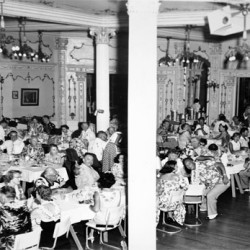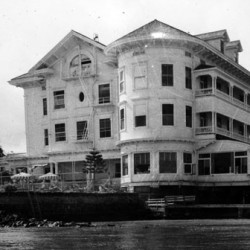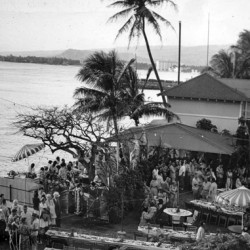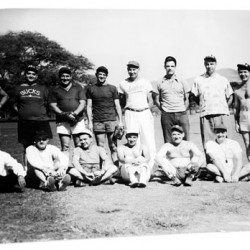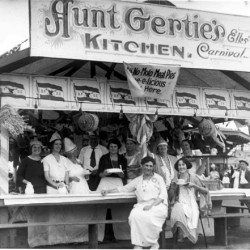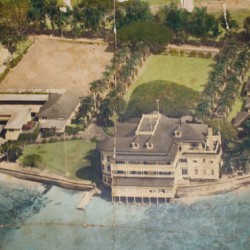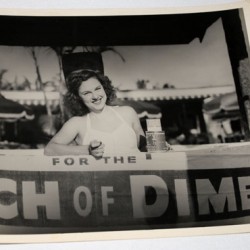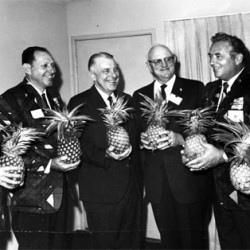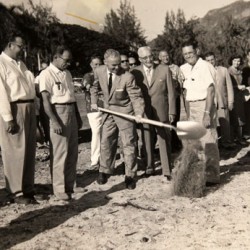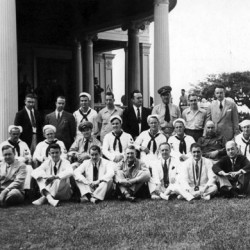HI Society
The Benevolent and Protective Order of the Elks has evolved while always contributing to the community.
It may not have been profound or even deliberate, but in 1901, Hawai‘i took a baby step toward establishing statehood when a Benevolent and Protective Order of Elks Lodge was initiated in Honolulu. The group’s ties to statehood promoters would later help the attraction of seriously considering Hawai‘i as state worthy.
A fiery, aggressive fraternal group in its early stages, the BPOE were known for their questionably harmful initiations for incoming members, but also were recognized for their charitable acts within their lodging communities. Dozens of well-known American historical figures have gone through their blindfold initiations, including presidents Franklin D. Roosevelt, Harry S. Truman and John F. Kennedy.
With thousands of lodge chapters opened throughout the U.S.—since its initial creation in New York in 1867—BPOE mixed its way into Honolulu after annexation in 1898 Judge Jerome B. Fisher, Grand Exalted Ruler of the BPOE, made a special voyage to Hawaii to preside at the opening of Honolulu Elks Lodge No. 616, when he and Mainland members landed in Honolulu in April 1901.
Immediately, BPOE members took action to help structure Honolulu as a city and as a prominent location for the Elks nation.
“The one thing that struck me was that today we look on charitable activity as something to do, but not involve ourselves in,” says Elks Lodge 616 historian Anita Manning.
“Elks were personally involved in charitable acts, not something they just threw money towards. They took seriously what they were doing and who they were doing it for.”
The first couple decades saw the lodge bounce around Honolulu’s downtown district from Progressive Hall on the corner of Fort and Beretania Streets to a mid-renovated structure on Miller and Beretania Streets.
After gaining popularity with their unique and theatrical fundraisers and carnivals—which included the 1911 standing-room-only showcase of hula and geisha performances—Mrs. Castle, wife of prominent Honolulu businessman James B. Castle, sold the Elks their tranquil, yet large 155,000-square-foot property in the then-countryside of Waikiki, a property she could not tend to after her husband’s passing in 1918.
During times of war, Elks Lodge No. 616 served as a constructive location for young, impressionable soldiers to spend their time. Most mainland Elks Lodge’s would allow military men to spend nights, socializing in their clubs, but Honolulu Elks Lodge No. 616 went so far as to offer these boys membership, keeping many membership offers open after their deployments and returns.
“Soldiers could write their mothers and tell them they had been to the Elks Lodge, it was a little more difficult to write and tell her you were hanging out at Club Hubba Hubba,” adds Manning—who contributes her ties to ELKS 616 as a tribute to her grandfather.
Stretching past the fraternal ballyhoo of booze, broads and bands, Honolulu Elks made sure they were strengthening the community both in and outside of the lodge.
“Friendship was the foundation of the lodges, having people you could trust and to be brothers. Many of the lodge members were businessmen and if you’re going to have a business deal and you are going to have it with a lodge brother you can be sure they are not going to take advantage, because it would come back to all the lodge members,” says Manning.
In regards to charitable activities, Elks Lodge 616 consistently organized Thanksgiving Food Basket programs, delivering contributed food to needy families. Elks 616 raised funds for selected scholarships for area students and since 1926 has assisted Boy Scout Troops of Hawai‘i, including supporting Boy Scout Troop 12’s initiative to help those diagnosed with Hansen’s disease, who were separated from their families and brought to Mt. Happy School on the grounds of the Kalihi Receiving Station, before they were old enough to live alone at the Kalaupapa Leprosy Settlement on Molokai.
Since statehood in 1959, Elks Lodge No. 616 maintains its stature in Hawai‘i.
Now, a much less selective membership group, Elks has evolved into a more family-oriented affiliation, as sons and daughters of former Elks members bring their children to the lodge pool during summers or congregate for Easter egg hunts and Christmas parties. Current Elks No. 616 activity includes their inclusion in the Elks National Foundation (ENF), a major charitable arm of BOPOE, which in 2008-2009 distributed over $17 million to Elks scholarship programs, Veterans services, drug awareness and community investment programs.
Elks membership visitors from the mainland may feel free to bring their families to the Waikiki lodge as it is today as it was at the turn of the 20th century—a tropical place of acceptance, remembrance and growth.
Photos courtesy: Elks Lodge 616
- One of many festive elks socials at Elks Lodge 616.
- Mrs. Castle, widow of businessman James B. Castle, sold their Waikiki home to the Elks after he died in 1918.
- Philanthropy is an important part of Elks life; but so was socializing with fellow members.
- The Elks also sponsored baseball teams.
- Aunt Gertie’s Kitchen, one of the booths at the Elks Carnival.
- An aerial view of the Elks Lodge’s original Waikiki building.
- The Elks were also strong March of Dimes supporters.
- Elks members found a welcoming home-away-from-home when traveling to Waikiki.
- The Elks Lodge was an ideal place to network.
- The ground breaking ceremony for the current Elks building.
- Lodge officers and new members of 1942.




